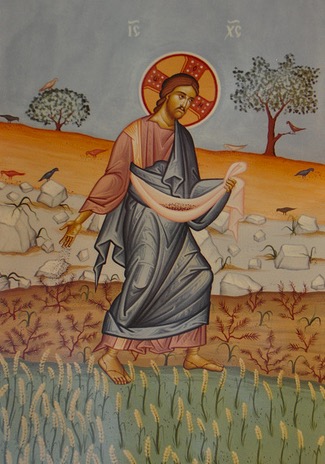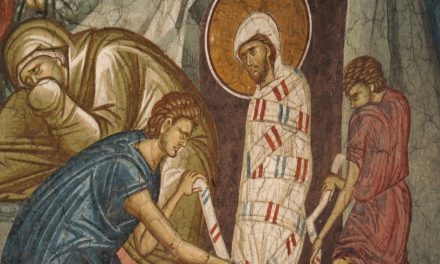11th Sunday in Ordinary Time
This Sunday’s readings may be found here at the USCCB’s website:
It can be tempting to think that the Bible is primarily about eternal truths or “religious beliefs,” particularly when one sets out to offer to others an interpretation of its theological meaning. Even if one takes full account of its fundamentally narrative quality, and duly notes the many rhetorical and literary devices it employs, the temptation remains to “boil the story down” to some unifying theme, ideal, or principle. The story of Eden is really about the consequences of rejecting creaturely dependence; the Exodus is really about God’s desire to liberate the oppressed; the Prodigal Son parable is really about God’s unconditional love, and so on. Yet there still remains something in the stories themselves that is more powerful than the lessons we can draw from them. The stories of the Bible are in an important sense irreducible to the theological insights we can draw from them. It is not only that such insights come across more clearly and evocatively when presented within the context of a narrative, although that is certainly true. The stories in the Bible are more than simply effective didactic instruments. The truths they contain are inseparable from the historical and narrative details that enflesh them, such that one must revisit the whole story itself to encounter once again the fullness of what it reveals.
I think we encounter this sort of irreducibility in the normal course of our lives, which we imagine and represent primarily in narrative form. Along the way we develop deeply held convictions about love, or justice, or freedom that we can articulate in the abstract through such principles as “to love is to will the good of another” or “one should always give to others what is their due,” or “I am responsible for my own conscious decisions,” but there is always a history behind such articulations, a history that colors our understanding of what such principles mean and why they are important. And I would go so far as to say that such convictions almost always find their root in some particular moment or series of moments that revealed to us the true meaning, power, and importance of the principle of which we took them to be an illustration. There is something about these moments in time that no abstract definition or maxim can capture. What is more, these moments occur more often than not in the course of everyday events and interactions. They are mostly unbidden, unexpected, and ordinary. To the external observer, such moments are indistinguishable from any other. To see someone attending the sickbed of a loved one, to smell the food someone is preparing for the hungry, to hear someone apologize for doing something wrong: these moments are so simple and ordinary, and yet within the larger narrative of our lives they can be moments of revelation that give us access to things eternal.
In his book New Seeds of Contemplation, Thomas Merton famously wrote that
every moment and every event of every man’s life on earth plants something in his soul. For just as the wind carries thousands of winged seeds, so each moment brings with it germs of spiritual vitality that come to rest imperceptibly in the minds and wills of men.
The Bible is full of moments like these. Such moments are in fact the primary mode by which the Bible conveys its meaning to us. Every moment is a seed, containing within itself something far larger, far different, and far beyond what we could imagine if we were to consider it on its own. We live amidst such moments, and yet only see their true importance once we have seen what comes from them over the course of time. Often it is only after many years that we can recognize such moments for what they are, and glimpse the power and significance of what they reveal. The Bible is full of such moments: the moment Eve began to entertain the serpent’s words, the moment Abraham resolved to leave his home, the moment David fixed his gaze upon Bathsheba, the moment Mary voiced her consent to the angel. All these moments are “seeds” of the human heart, planted in the soil of human history. They contain within them something much greater, which reveals itself through the course of history. They reveal something true that cannot simply be reduced to abstract propositions or prescriptions. Indeed, as Christians we believe that even today we continue to live out the story that has been shaped by these seemingly ordinary moments.
This week’s gospel reading recounts a moment when Jesus speaks of “seeds.” He is describing the kingdom of God in parables; or we might even say simple analogies:
this is how it is with the kingdom of God; it is as if a man were to scatter seed on the land and would sleep and rise night and day and through it all the seed would sprout and grow, he knows not how… And when the grain is ripe, he wields the sickle at once, for the harvest has come.
Specifying further, Jesus compares the kingdom of God to a mustard seed “that, when it is sown in the ground, is the smallest of all the seeds on the earth. But once it is sown, it springs up and becomes the largest of plants and puts forth large branches, so that the birds of the sky can dwell in its shade.”
The gospel concludes with the narrator remarking that Jesus “spoke the word to them as they were able to understand it. Without parable he did not speak to them, but to his own disciples he explained everything in private.”
Even before jumping to the meaning of these parables, or the reasons behind Jesus’ employment of parables, I think we should appreciate the “moment” represented by the gospel account. St. Ignatius famously advocated that readers try to enter into the gospels, by imagining what it would have been like to be present at any given moment in the narrative. It is easy enough to do for the nativity, or the healing stories, or even the crucifixion, but with moments of teaching like this one it can be a little harder. But it is important to remember that someone was there when Jesus told these parables, and this moment left a deep enough impression upon someone’s memory that it found a place in the gospel text. In other words, for someone this moment itself was a “seed” that grew with time and became something much larger and far different than its initial appearance. These little parables found a place in someone’s heart, and there they grew and ultimately came to reveal the life that hid inside them. That person may not have recognized them for what they were at the time (parables were especially puzzling in this way), but their openness to receive them somehow led—who knows how?—into something much more precious, momentous, and profound.
We can never know exactly what seeds God is planting, where He is planting them, or how He plans to make them grow. The wind of the Spirit blows them where it wills. Yet these seeds contain the life that God intends for us to share with Him and with one another. They contain the fruit of the “kingdom” God wishes to establish among us. Indeed, they are the seeds of Christ’s continuing presence in time, the seeds of His vineyard which He will one day gather to Himself. We can never know the full significance of each thought, each word, each action in any given moment; we cannot imagine what fruit it may contain, what it might be leading us to, or what future life might one day “dwell in its branches.”




Trackbacks/Pingbacks